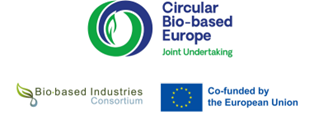Transforming Organic Waste into Valuable Biobased Succinic Acid
The first phase of the four-year Circular Bio-based Europe Joint Undertaking (CBE JU) Project LUCRA kicked-off in Ghent. LUCRA aims to demonstrate a unique process to convert underutilized organic fraction of municipal solid waste (OFMSW) and wood waste into bio-based succinic acid. The project is set to provide the bio-based industry with a sustainable and cost-effective solution that meets the increasing demand for this versatile platform chemical in the food, pharmaceutical, cosmetic, and chemical industries.
Intermediate building blocks, nowadays mainly fossil-based, are important for synthesising other chemicals, polymers, resins, coatings, solvents, and plasticizers. As stricter regulations are being placed, and market demands and consumer preferences are moving towards more sustainable products, the chemical industry is searching for viable and cost-effective alternatives to fossil-based building blocks such as succinic acid.
Therefore, the production of biobased succinic acid holds vast market potential, and its production from organic waste sources addresses both environmental and economic concerns.
A collaborative and multidisciplinary approach for biobased succinic acid
Ten industrial partners and renowned research centres from seven countries representing the whole value chain from feedstock to products have joined forces to demonstrate the technical and economic feasibility of transforming organic waste into bio-succinic acid on a pre-industrial scale. By combining cutting-edge thermal and enzymatic technologies, innovative fermentation and electrochemical processes, the consortium led by Bio Base Europe Pilot Plant will pave the way for a sustainable, resource-efficient, and circular bioeconomy.
“We are excited to kick off the LUCRA Project as a significant contribution towards a more sustainable chemical industry” said Tanja Meyer, LUCRA project coordinator and senior project manager at Bio Base Europe Pilot Plant. The demand of our customers for sustainable bio-based solutions is continuously increasing. Hence, “the LUCRA project is of high relevance for us as it makes use of second generation biomass to produce a relevant building block for our materials” added Dr. Vera Essmann lab head for R&D PUDs at Covestro.
Over the course of the project, extensive validation and demonstration activities in various European locations will take place to optimize the production process at a pre-industrial scale, evaluate the environmental impact and circularity of the process, and validate its economic feasibility. The final products, namely succinic acid-based polyester and resins will also be validated e.g. in products for the textiles industry, guaranteeing the products meet the required technical and economic specifications. The results and insights of LUCRA will help to turn common waste and residue materials into a valuable resource for chemical products.
"The launch of the LUCRA project is an exciting development for the European chemical industry, as it sets out to support the industry’s transformation in line with the EU Green Deal's goals," said Nicoló Giacomuzzi-Moore, Executive Director ad interim of the CBE JU. “This project is a great example of how CBE JU-funded initiatives advance sustainable and competitive bio-based industries. By setting up innovative bio-based processes and value chains, LUCRA will unlock the potential of sustainable biomass and reduce CO2 emissions compared to traditional production methods, which will help strengthen Europe's sustainability.”
Mr. Giacomuzzi-Moore also highlighted the leading role small and medium-sized enterprises (SMEs) play in the CBE JU programme: “39% of the beneficiaries in our programme are SMEs, and they are leading projects that go from basic research to industrial deployment. By leading the CBE JU-funded LUCRA project, Bio Base Europe Pilot Plant exemplifies how small businesses bring bio-based solutions closer to our everyday life."
Project Coordinator
Tanja Meyer
Bio Base Europe Pilot Plant vzw
Media Contact
Dr. Alejandra Campos
Steinbeis Innovation gGmbH
alejandra.campos@steinbeis-europa.de
Project Partners
Bio Base Europe Pilot Plant vzw (Belgium)
Universiteit Gent (Belgium)
Hydrohm (Belgium)
Montinutra Oy (Finland)
Covestro Deutschland AG (Germany)
Geoponiko Panepistimioun Athinon (Greece)
Consiglio Nazionalle delle Ricerche (Italy)
FCC Medio Ambiente (Spain)
Steinbeis Innovation GgmbH (Germany)
Ineuvo LTD (United Kingdom)
Disclaimer
The project is supported by the Circular Bio-based Join Undertaking and its members.
Funded by the European Union. Views and opinions expressed are however those of the author(s) only and do not necessarily reflect those of the European Union or CBE JU. Neither the European Union nor the CBE JU can be held responsible for them.
Funded by European Union
About Circular Biobased Europe (CBE JU)
The Circular Bio-based Europe Joint Undertaking (CBE JU) is a €2 billion public-private partnership between the European Union and the Bio-based Industries Consortium (BIC) funding projects to develop sustainable and innovative solutions that drive the transition towards circular bio-based industries in Europe. Through research, development, and implementation projects, CBE JU aims to create new value chains, reduce waste, and contribute to Europe's circular economy goals.
CBE JU is operating under the rules of Horizon Europe, the EU’s research and innovation programme, for the 2021-2031 period. The partnership is building on the success of its predecessor, the Bio-based Industries Joint Undertaking (BBI JU), while addressing the current challenges facing the industry.

